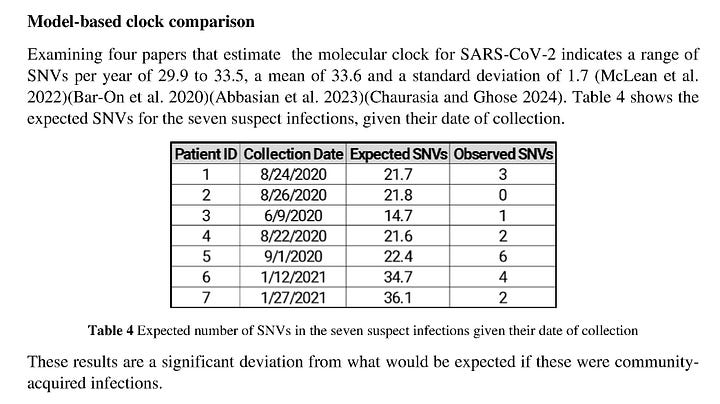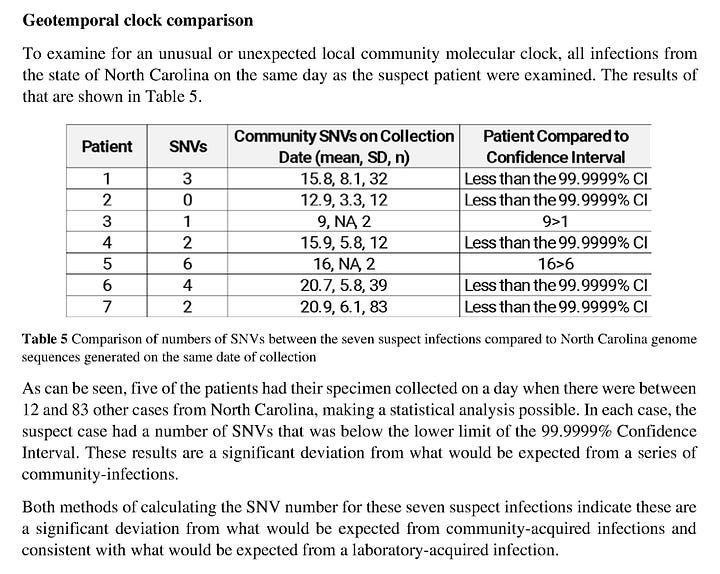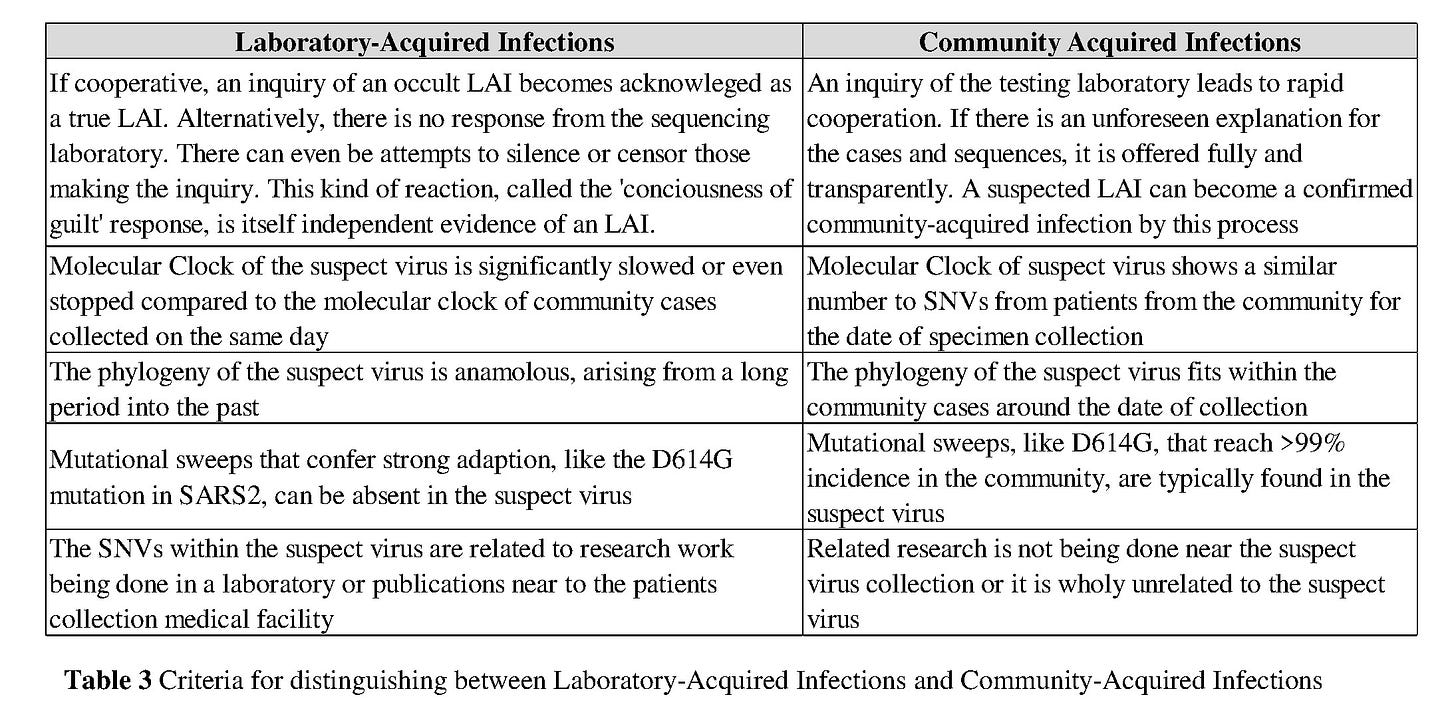UNC lab leaks? Evidence indicates seven lab-acquired SARS-CoV-2 infections in Chapel Hill during pandemic, researchers say
Interview w/ Drs. Steven Quay and Steve Massey
If once is happenstance and twice is coincidence, what do we call seven instances of apparent lab-acquired SARS-CoV-2 infections in relation to coronavirus research at the University of North Carolina at Chapel Hill?
Using "forensic virology" techniques, Steven E. Massey, PhD and Steven Quay, MD, PhD have identified and put forward evidence regarding these "anomalous genome sequences" in a recent preprint titled "The Illusion of Biosafety During SARS-CoV-2 Research: Multiple Apparent Occult Lab-Acquired Infections Are Identified Under BSL-3 Conditions at a Premier US-based Coronavirus Laboratory."
UNC and the COVID-19 Pandemic
UNC-Chapel Hill is home to distinguished coronavirologist Dr. Ralph Baric, though whether he is distinguished for his work in fighting COVID-19 or for his involvement in gain of function research and possible role in the origins of COVID-19 is a matter of perspective.
What is known for a fact is that Baric was one of the co-authors of the infamous Project DEFUSE, which has been described as a "smoking gun" or a COVID-19 "blueprint" for its proposed gain-of-function research on bat coronaviruses, which the authors privately noted was "downplaying" the planned involvement of researchers at the Wuhan Institute of Virology (WIV), with Baric himself noting that "US researchers will likely freak out" if they found out that the viruses in question would be "grown" under substandard biosafety conditions (BSL-2).
Although DARPA, the recipient of the DEFUSE proposal, declined to fund the research, many believe the evidence points in the direction of the COVID-19 pandemic being a result of this very sort of synthetic virus engineering being performed at the WIV with another source of funding.
Lab-Acquired Infections?
The potential lab leaks outlined in the paper by Quay and Massey are not related to the origins of COVID-19, but rather involve the reintroduction of previously isolated wild strains of SARS-CoV-2 being studied at UNC-Chapel Hill labs operating under the higher biosafety levels of BSL-3 and BSL-4.
The technique the researchers used to identify the seven Chapel Hill samples out of the millions registered in a research database as being likely lab-acquired is based on the ever-mutating nature of the virus.
"The concept is pretty simple," explained Quay in an interview which he and his co-author gave to This Week in the Triangle. "If you see a genome that has too few mutations compared to what's going on in the community, it is effectively frozen. It is appearing from a time in the past, it's jumping into the present. That's a hallmark of something that came out of a refrigerator, went into a patient, and then went into the community."


In addition to the absence of expected mutations, the paper lists a series of indicators to differentiate between a lab-acquired and community-acquired infection, including whether the potential source lab is thoroughly investigating vs stonewalling, whether the virus matches contemporary strains in the community, whether the virus contains "mutational sweeps" (adaptions so beneficial they quickly dominate the viral population), and whether the virus is similar to strains being examined at nearby research institutions.

The paper goes on to outline which specific coronavirus research being conducted at UNC during the pandemic lined up with these seven sequences from infected individuals submitted by the UNC Medical Center Clinical Molecular and Microbiology Lab, including a particular early and widespread mutation of SARS-CoV-2 referred to as "D614G."
"The viruses we were finding in the patients were exactly the viruses you would be studying in the laboratory if you're going to look at this very single change," said Quay.
Another anomalous feature of the seven cases in question is the age of the infected individuals, with 5 out of the 7 being between the ages of 21 and 26.

UNC Response?
The authors could find no evidence of these incidents being reported to any health authority, leading them to categorize the infections as "occult" or unknown to the university.
"If you have such an infection in a laboratory that's doing some of the kinds of research that are typically done at UNC, which is gain of function or coronaviruses or select agents (there's a bunch of categories), you're obliged to report those to the CDC or to the NIH or to others," said Quay.
However, Quay and Massey have been disappointed with the lack of any direct response they have received to their attempts to communicate with both the sequencing lab as well as the Associate Vice Chancellor for Campus Safety and Risk Management Derek Kemp.
"You would hope that if they're working with pathogens that they would be transparent about their work because it doesn't affect just them if an experiment goes wrong, it affects everybody, potentially worldwide, but certainly locally in North Carolina," said Massey.
The pair say they did an indirect response via GISAID, who manages the SARS-CoV-2 genome database, letting them know that individuals at the CDC and UNC had complained about the raw sequencing data included in the first version of the paper, which was in violation of the database's terms of service.
"There's been cases over the last four years where Chinese doctors have clearly uploaded sequences into the NIH database and then taken them off," said Quay. "I was a little concerned about that, so I put the sequences in the supplement. I wasn't supposed to do that, and I shouldn't have done that probably."
Independence vs Oversight
Massey and Quay believe that the lack of transparency in response to their findings is a representative of a larger problem, that the motives of research institutions to continue being funded is not aligned with the public interest of full transparency regarding potential hazards.
"There's a conflict of interest there because they're not incentivized to publicize any potential lab accidents," said Massey. "The key problem in biosafety issues when working with pathogens is the self-reporting."
"Doing everything in-house is not independent," continued Massey. "We saw that with the Wuhan Institute of Virology; there wasn't an independent audit of the WIV, and there's credible concerns of a lab escape from that institution."
In response to a question about potential legislative oversight regarding biosafety at this public education, Quay suggested that any legislator interested in the topic could begin with the documents potentially related to the origins of COVID-19 requested by US Right to Know which were withheld by UNC, and are currently the subject of a lawsuit.
Previous Coverage:
Public Records Lawsuit Against UNC by Medical Watchdog Group Investigating COVID-19 Origins Advances (Original Article — Nov. 6, 2023)
UNC claims "research project collaborations" are exempt from public records statute in COVID-19 origins investigation lawsuit (No. 57 — Feb. 3, 2024)
U.S. Right to Know public records lawsuit reveals efforts to evade transparency (No. 58 — Feb. 10, 2024)
Coronavirus Pandemic Subcommittee alleges FBI interest in UNC/COVID origins public records requests (No. 59 — Feb. 17, 2024)
UNC COVID-19 Origins Public Records Lawsuit: what does "proprietary mean"? (No. 61 — Mar. 2, 2024)
"Stop Gain of Function" rally at UNC-Chapel Hill (No. 62 — Mar. 9, 2024)
UNC-linked coronavirus researcher accused of "discrepancies in testimony" (No. 66 — Apr. 6, 2024)
UNC coronavirologist Ralph Baric: "can't rule out" lab leak origin of COVID-19 (No. 70 — May 4, 2024)
3rd Party Report Finds UNC Withheld Public Records Requested by Medical Watchdog Group Investigating COVID-19 Origins (Original Article — Aug. 1, 2024)
Judge rules in favor of UNC in public records suit brought by medical watchdog investigating COVID-19 (No. 94 — Oct. 19, 2024)
U.S. Right to Know appeals public records lawsuit ruling vs UNC (No. 99 — Nov. 23, 2024)

